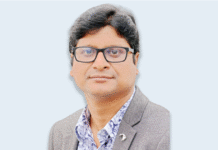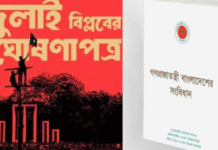Development isn’t the main challenge anymore

It’s time to focus on fighting corruption
For Bangladesh — development is no more a challenge. Now, the pressing hurdles are fighting corruption, social oppression, terrorism, and illegal drugs.
Take, for instance, social oppression. Farmers in Bangladesh are still getting neglected. Despite the abundance of resources, the common people of the haor regions are deprived of supplies; incidents of rape are increasing, and few are getting justice.
When it comes to corruption, we can probably write a few hundred books, since there is so much of it. Corruption has seeped its way into public resource distribution, public procurement, and public service delivery.
Corruption undermines human development. It forces a cutback in public rights, opportunities, entitlement, and dignity. It also discourages investment, distorts markets, damages private sector integrity, and erodes trust in government and democratic institutions. And clearly, corruption has a nexus with social oppression.
Combating corruption is not just complex, but can also be extremely challenging. In many instances, it seems to be invisible. One simply cannot see when a fish drinks water.
Corruption puts a country in an extremely difficult position, but even the most challenging problems can be solved with effective planning. Countries all over the world face this issue, and some have formed well-known anti-corruption models — Hong Kong’s Independent Commission Against Corruption (ICAC), Singapore’s Corrupt Practices Investigation Bureau (CPIB), and Botswana’s Directorate on Corruption and Economic Crime (DCEC).
Strategies to fight corruption
Provision of higher incentives and higher penalties
Disclosure of asset, income, and liabilities: Who, what, and where to disclose, and who has access to the information
Abolishing the culture of impunity
Appropriate use of ICT and e-governance
Introducing civic education and youth learning program for good governance
Robust implementation of National Integrity Strategy (NIS)
All these can be achieved with the help of highly competent, knowledgeable, and ethically sound anti-corruption commission with sturdy legal support.
Nonetheless, political willingness, as well as committed and visionary leadership, is a prerequisite to succeed with durable results in the anti-corruption movement.
Unless politics becomes transparent and pure, all sub-systems will continue being corrupt. So, it is a must to enforce political reform. Politics must walk through the path, philosophy, and morality as Bangabandhu prescribed.
We are hopeful herein for two reasons — first, we have so far developed an excellent strategy document: NIS.
I had a chance to review this strategy document for the Cabinet Division of the government of Bangladesh as an independent consultant, appointed by the Asian Development Bank (ADB) under its good governance program. The reviewed and updated NIS is truly a splendid document. What is required now is a full-bodied implementation of the strategy.
Second, we have a visionary prime minister for three consecutive terms. She has succeeded in many areas, including in turning the country’s image in the globe with her reputation for charismatic leadership and her ethics, as well as making the development roadmap of the country.
She is trying hard to put the right things in the right places to combat corruption sturdily, and reduce social oppression substantially. This is, however, a collective business. The PM alone cannot solve a problem that is rooted in a certain political and administrative culture.
But she can surely focus on bridging, transforming, and building ethical leadership by getting competent and highly committed young people involved in politics and state governance.
Mohammad Rafiqul Islam Talukdar is Associate Professor, Government and Politics, and Director (Research), at Asian University of Bangladesh. He can be reached at rafiqul.talukdar@gmail.com.









